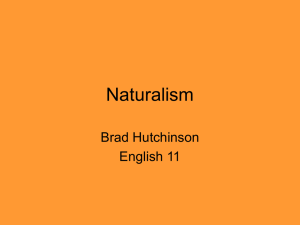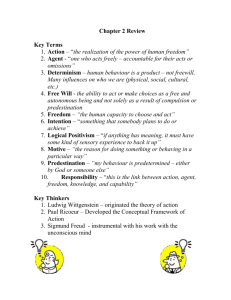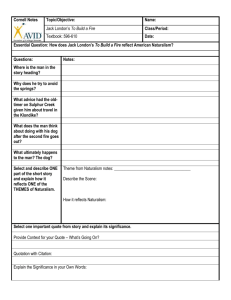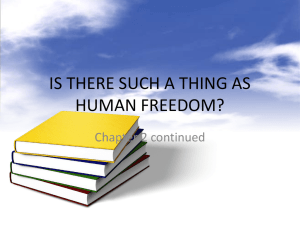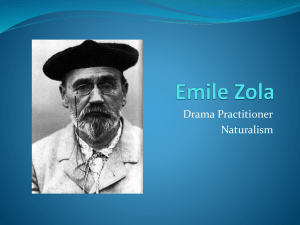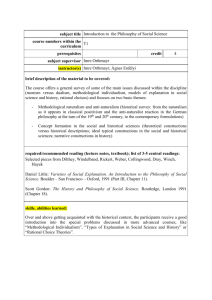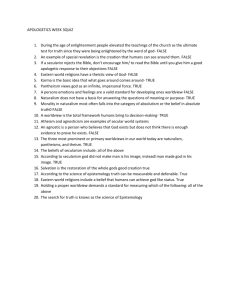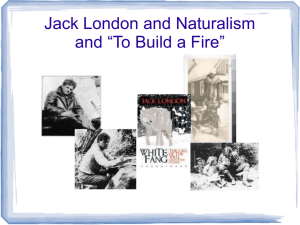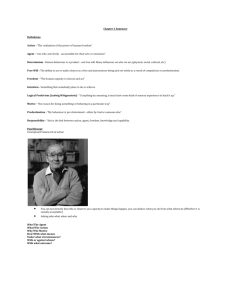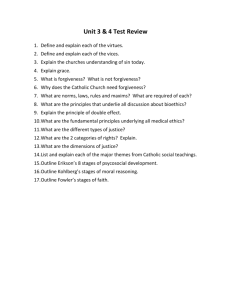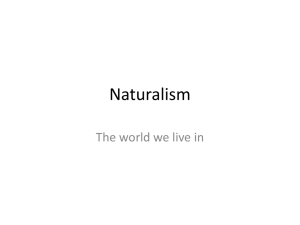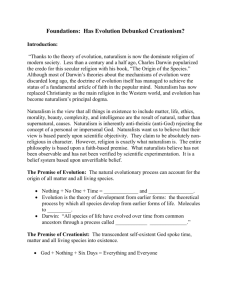Religion 35 - God and Ethics (Ch
advertisement
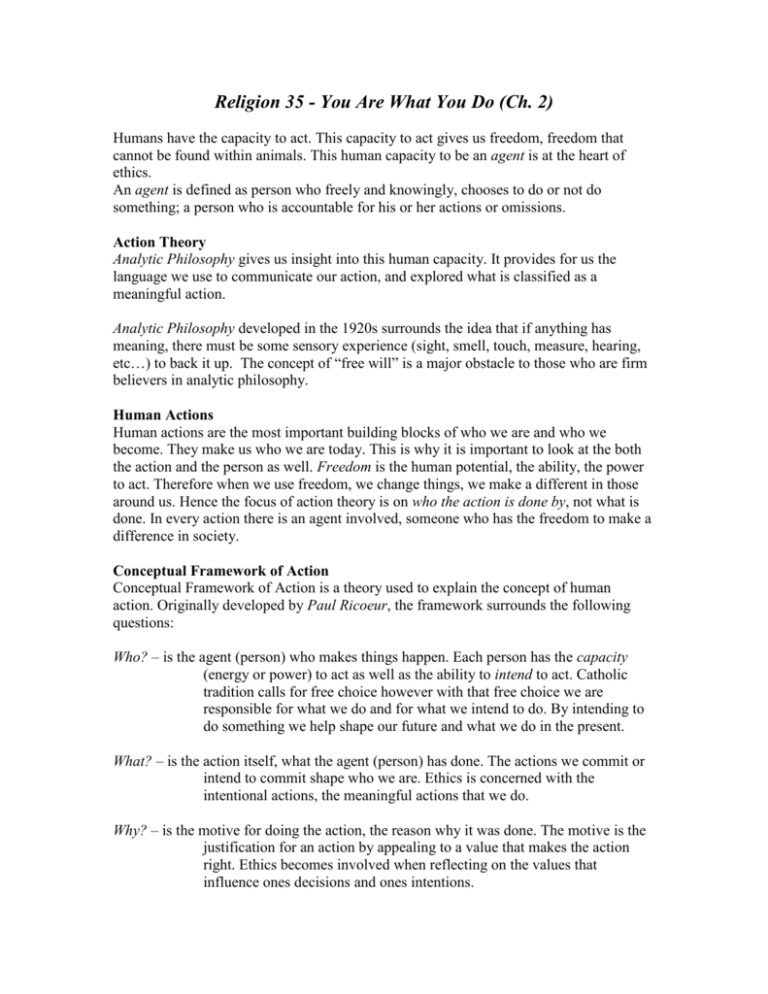
Religion 35 - You Are What You Do (Ch. 2) Humans have the capacity to act. This capacity to act gives us freedom, freedom that cannot be found within animals. This human capacity to be an agent is at the heart of ethics. An agent is defined as person who freely and knowingly, chooses to do or not do something; a person who is accountable for his or her actions or omissions. Action Theory Analytic Philosophy gives us insight into this human capacity. It provides for us the language we use to communicate our action, and explored what is classified as a meaningful action. Analytic Philosophy developed in the 1920s surrounds the idea that if anything has meaning, there must be some sensory experience (sight, smell, touch, measure, hearing, etc…) to back it up. The concept of “free will” is a major obstacle to those who are firm believers in analytic philosophy. Human Actions Human actions are the most important building blocks of who we are and who we become. They make us who we are today. This is why it is important to look at the both the action and the person as well. Freedom is the human potential, the ability, the power to act. Therefore when we use freedom, we change things, we make a different in those around us. Hence the focus of action theory is on who the action is done by, not what is done. In every action there is an agent involved, someone who has the freedom to make a difference in society. Conceptual Framework of Action Conceptual Framework of Action is a theory used to explain the concept of human action. Originally developed by Paul Ricoeur, the framework surrounds the following questions: Who? – is the agent (person) who makes things happen. Each person has the capacity (energy or power) to act as well as the ability to intend to act. Catholic tradition calls for free choice however with that free choice we are responsible for what we do and for what we intend to do. By intending to do something we help shape our future and what we do in the present. What? – is the action itself, what the agent (person) has done. The actions we commit or intend to commit shape who we are. Ethics is concerned with the intentional actions, the meaningful actions that we do. Why? – is the motive for doing the action, the reason why it was done. The motive is the justification for an action by appealing to a value that makes the action right. Ethics becomes involved when reflecting on the values that influence ones decisions and ones intentions. How? With What Means? – is the method for which an agent (person) carries out an action. Furthermore, the way one carries out an action will say something about the type of person they are. Under What Circumstances? – is the situation surrounding an action the agent (person) commits. The circumstances will impact ones level of responsibility. It will also worsen or enhance the outcome of ones action. With Whom or Against Whom? – is when an agent (person) seeks approval or disapproval of another individual. An action is also an interaction, whether it is with others or against others. With What Outcome? – is the result of the agents (person) action, whether intended or not. Each action or intent affects the self in a good or bad way. It is important to note that this framework explains that an action is only good when it fulfills certain conditions and that an action cannot be good in itself. The integrity of human acts depends on a) the object chosen, b) the intention, and c) the circumstance around the action. Human Freedom When one exercises their human freedom, the action makes a mark or change in the world. We are free because we have possibilities, though many unrealized possibilities. You can reach into your future by giving your word today and keeping it because these promises and commitments orientate your future. The capacity to act intentionally has been identified as a spiritual quality. Many philosophers disagree on how to explain the human ability to initiate an action. Some suggest that if there is intent to act but nothing is done than there was no action whereas many suggest there were chemical and neural changes as a result of the thought of intent. Naturalism Naturalism believes the material universe is built around a unified system involving physical, biological, psychological, social, and environmental factors: science reigns supreme. Everything, including humanity, is part of a cause and effect chain which results in a conflict with the notion of human freedom. Naturalism believes that everything one does is due to genetic disposition. This idea means you cannot control what you do because your genes are programmed to control your actions therefore excusing any responsibility for our actions. The philosophy behind artificial intelligence is naturalism because they both focus on the human brain and its neural networks. Naturalism views the brain and the body as objects that are separate the self. Artificial Intelligence Artificial Intelligence (AI) is the ability for a machine, like a computer, to replicate human cognitive mental states. There are two types of AI: Strong AI – the idea of replicating human cognitive mental states Weak AI – the idea that computers can simulate some thinking-like features, but no more. The Mind-Brain Distinction Our society today believes that the mind is simply the brain at work. The Catholic Church believes that the human mind is much more than physical functions like perception, thinking, learning, and decision-making. The mind provides a capacity for freedom, choice, or action. The mind is at the root of the human ability to receive God’s revelation of faith, to understand His message and to live in hope, and live a life of loving service. Religious Determinism Religion determinism surrounds the idea of how religion can affect our freedom and our choices. There are three specific beliefs systems that look at religious determinism. Predestination – God predetermines the course of the world, human action, and history. This leaves no room for human freedom and subsequently no human free will because with no freedom there is Providence – God has influences events and actions. Catholics believe in this perspective as it allows for free will and human freedom. Puritan Tradition – belief that sin has deprived humans and as a result we live our lives in eternal damnation. This beliefs suggests that God does not want to save everyone because they believe God loves some and rejects others. Salvation is God’s initiative of love however God’s love requires and makes possible our cooperation. Catholics reject this belief system. Social Determinism Social determinism is similar to naturalism which suggests that behaviour can be determined by the influences of others like parents, teachers, social background, race, gender, age, etc…Ones past determines who a person is and their behaviours can be explained by social factors, not ones decisions. Sigmund Freud says that when one puts their experiences into ones unconscious mind, the conscious mind does not have to deal with it directly. One cannot be free unless one reconnects with the repression. Everything in ones life makes up their identity. Who, then, is the Self? The self is built up of one’s identity. Everything from one’s past and one’s present life builds up to form one’s identity however that past and present are not the complete picture. Human action provides us with an opportunity to project ourselves into the future by making promises, commitments, and choices that will affect our identity.
